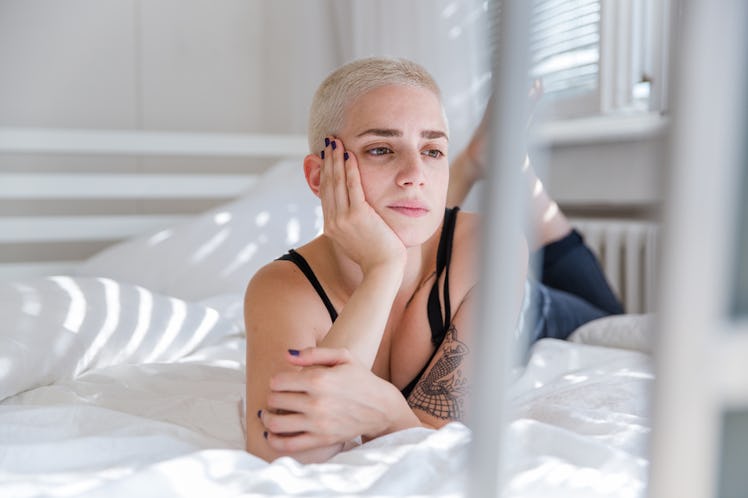
Everyone has been in that unfortunate situation at least once before: You're bleeding at the wrong time of the month. Not to be overly dramatic, but it can be borderline apocalyptic to find out that you're spotting when you weren't prepared for it (i.e. when you're wearing your cleanest, whitest pair of pants). What most people don't know, though, is that there are certain things your body may be trying to tell you if you're spotting between periods all the time.
Your menstrual cycle is entirely reliant upon, and determined by, the flow of hormones like estrogen and progesterone in your body. This is why contraceptives can often affect your period in unexpected ways: Whenever you add or subtract hormones from your system, you're inevitably making some sort of an impact on your period.
But what does it mean if you're spotting all the time between periods? Of course, a little bleeding at the wrong time of the month doesn't equate to a death-bed situation. In fact, it often means absolutely nothing at all. Mother Nature is just a fickle lady. But if it's happening more often than not, there's a good chance your body is trying to tell you something, and you should pay attention. Here are 10 potential things your body is trying to call attention to if you're spotting all the time.
If you just switched contraception — especially if you just got an IUD — spotting is a common side effect. However, it tends to stop after a few months of consistent use of your new contraception, so if it continues to happen past six months' time, you should speak to your gynecologist to see what's up.
Emergency contraception often causes light spotting. The highly concentrated blast of hormones that come with emergency contraception can often affect your menstrual cycle, causing you to bleed a little later or earlier than usual.
However, regardless of whether you spot or not, you should continue to take your other form of contraception the day after you take the morning-after pill.
This one's more intuitive: Any sort of aggressive foreplay or sex can often lead to slight bruising or bleeding. In the same way you give each other (or yourself — hey, no judgement) bites and scratches on the skin when y'all are between the sheets, sometimes you can get a little too enthusiastic, and you may end up scratching the interior of your vaginal wall.
This isn't necessarily a big deal, but if you're feeling a lot of pain or you're bleeding excessively, you should definitely call your doctor to make sure there's no chance of infection.
Bleeding or spotting between periods could potentially be a sign that you have some sort of bacterial infection or inflammation down there. It might be from sex (see above), or it could be an STI. If you're bleeding and you also see signs of discharge or strange smells, you should definitely speak with your doctor ASAP. Avoid the urge to try any home remedies like douching as a solution before you speak to a professional.
If you skipped a pill or two of your birth control, spotting is a normal response, as you've altered the hormone flow that your body (and more specifically, your menstrual cycle) has become accustomed to.
What's more, if you're the type of person who seems to forget about that pill often (hi, me too), you might want to consider switching contraception to something that doesn't require daily ingestion. Forgetting a pill lowers the percentage of success in preventing pregnancy, and therefore should not be trifled with.
Vaginal dryness is commonly associated with menopause, but this is a misconception, as it can definitely happen with younger women, as well. Vaginal dryness can be caused by frequent sex, childbirth, hormone treatments, contraceptives, and various medications, like antidepressants, for example.
If you're bleeding or spotting, it could be a sign that you have vaginal dryness, in which case you should talk to a doctor to narrow down the potential causes and solutions.
Uterine fibroids are benign tumors that grow within the muscular tissue of the uterus, and they affect between 20 and 40 percent of women aged 35 and older. However, all women of "childbearing age" (aka who have their periods) are at risk of getting them.
Don't worry, they don't have anything to do with cancer, but they can cause bleeding or pelvic pain, and if you have them, it's definitely better to know than to be in the dark. Again, talk to your doctor to find the root of the cause and the treatment you need.
Estrogen and progesterone are the hormones responsible for regulating your cycle, so it follows that if they get out of balance, your period might become a little wonky.
According to Healthline, any of the following factors can affect your hormonal balances: dysfunctional ovaries, thyroid problems, and a change or inconsistency with birth control pills.
When you're stressed out, it's not just your head that's pounding. Your body responds to the hormones that are released during times of stress, and in some extreme instances, your period can come to a full stop if you're stressed enough.
On the other hand, you can also start bleeding at a time of the month when your period isn't supposed to be happening. The bottom line is remembering that extreme stress has the power to affect every aspect of your life, even your menstrual cycle.
In rare instances, vaginal bleeding or spotting can be symptoms of more extreme illnesses, including diabetes, thyroid issues, and some forms of cancer. This is why it's crucial to consult with your doctor, just to be clear about what's going on with your body and how you should best approach a solution.
This article was originally published on